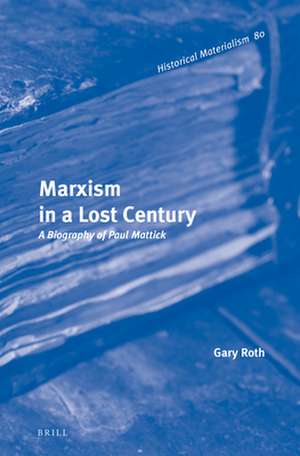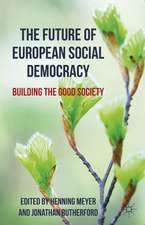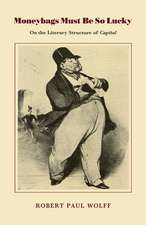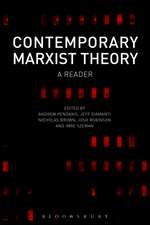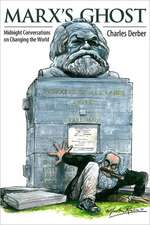Marxism in a Lost Century: A Biography of Paul Mattick: Historical Materialism Book Series, cartea 80
Autor Gary Rothen Limba Engleză Hardback – 27 noi 2014
Din seria Historical Materialism Book Series
-
 Preț: 215.03 lei
Preț: 215.03 lei - 18%
 Preț: 966.97 lei
Preț: 966.97 lei - 18%
 Preț: 990.17 lei
Preț: 990.17 lei - 18%
 Preț: 1092.16 lei
Preț: 1092.16 lei - 18%
 Preț: 1229.68 lei
Preț: 1229.68 lei - 18%
 Preț: 1241.69 lei
Preț: 1241.69 lei - 18%
 Preț: 1190.02 lei
Preț: 1190.02 lei - 18%
 Preț: 893.05 lei
Preț: 893.05 lei - 18%
 Preț: 1401.90 lei
Preț: 1401.90 lei - 18%
 Preț: 928.61 lei
Preț: 928.61 lei - 18%
 Preț: 690.93 lei
Preț: 690.93 lei -
 Preț: 268.72 lei
Preț: 268.72 lei - 18%
 Preț: 674.66 lei
Preț: 674.66 lei - 18%
 Preț: 606.89 lei
Preț: 606.89 lei - 18%
 Preț: 783.83 lei
Preț: 783.83 lei - 18%
 Preț: 584.79 lei
Preț: 584.79 lei - 18%
 Preț: 711.88 lei
Preț: 711.88 lei - 18%
 Preț: 653.06 lei
Preț: 653.06 lei - 18%
 Preț: 531.92 lei
Preț: 531.92 lei - 18%
 Preț: 618.25 lei
Preț: 618.25 lei - 18%
 Preț: 647.76 lei
Preț: 647.76 lei - 18%
 Preț: 710.71 lei
Preț: 710.71 lei - 18%
 Preț: 922.25 lei
Preț: 922.25 lei - 18%
 Preț: 810.75 lei
Preț: 810.75 lei - 18%
 Preț: 996.79 lei
Preț: 996.79 lei - 18%
 Preț: 815.23 lei
Preț: 815.23 lei - 18%
 Preț: 1506.61 lei
Preț: 1506.61 lei - 18%
 Preț: 852.64 lei
Preț: 852.64 lei - 18%
 Preț: 645.67 lei
Preț: 645.67 lei - 18%
 Preț: 781.47 lei
Preț: 781.47 lei - 18%
 Preț: 615.24 lei
Preț: 615.24 lei - 18%
 Preț: 1155.48 lei
Preț: 1155.48 lei - 18%
 Preț: 1063.00 lei
Preț: 1063.00 lei - 18%
 Preț: 867.10 lei
Preț: 867.10 lei - 48%
 Preț: 1092.66 lei
Preț: 1092.66 lei - 36%
 Preț: 765.88 lei
Preț: 765.88 lei - 18%
 Preț: 648.19 lei
Preț: 648.19 lei - 18%
 Preț: 759.38 lei
Preț: 759.38 lei - 18%
 Preț: 716.43 lei
Preț: 716.43 lei - 18%
 Preț: 671.15 lei
Preț: 671.15 lei - 18%
 Preț: 671.56 lei
Preț: 671.56 lei - 18%
 Preț: 760.94 lei
Preț: 760.94 lei - 18%
 Preț: 1012.79 lei
Preț: 1012.79 lei - 18%
 Preț: 817.26 lei
Preț: 817.26 lei - 18%
 Preț: 656.87 lei
Preț: 656.87 lei - 18%
 Preț: 1298.20 lei
Preț: 1298.20 lei - 18%
 Preț: 791.88 lei
Preț: 791.88 lei - 18%
 Preț: 971.69 lei
Preț: 971.69 lei - 18%
 Preț: 635.15 lei
Preț: 635.15 lei
Preț: 698.22 lei
Preț vechi: 851.49 lei
-18% Nou
Puncte Express: 1047
Preț estimativ în valută:
133.62€ • 138.99$ • 110.31£
133.62€ • 138.99$ • 110.31£
Carte indisponibilă temporar
Doresc să fiu notificat când acest titlu va fi disponibil:
Se trimite...
Preluare comenzi: 021 569.72.76
Specificații
ISBN-13: 9789004227798
ISBN-10: 9004227792
Pagini: 344
Dimensiuni: 155 x 235 x 23 mm
Greutate: 0.68 kg
Editura: Brill
Colecția Brill
Seria Historical Materialism Book Series
ISBN-10: 9004227792
Pagini: 344
Dimensiuni: 155 x 235 x 23 mm
Greutate: 0.68 kg
Editura: Brill
Colecția Brill
Seria Historical Materialism Book Series
Cuprins
List of Photos
Acknowledgements
List of Abbreviations
About the Notes
1. Introduction
2. Children at Work and War
2.1 At Home
2.2 Protest and Revolution
2.3 Revolution in Retreat
3. Young Radicals
3.1 March 1920
3.2 KAPD
4. Between Berlin and Cologne
4.1 Bouts of Unemployment
4.2 Movement in Decline
4.3 Older Friends
5. New Worlds
5.1 Voyages
5.2 Work and Writing
5.3 Amalgamation
6. Chicago in the Depression
6.1 Opening Years
6.2 Opposition and Accusations
6.3 Across the Country
6.4 Crisis Theory
7. The Unemployed Movement
7.1 The Workers League
7.2 Federation and Party
7.3 Fascism’s Initial Impact
7.4 The German Émigré Community
8. The Independent Left
8.1 German to English
8.2 Editors’ Reluctance
9. International Council Correspondence
9.1 Pamphlets and Authors
9.2 The Inevitability of Communism
9.3 Mid-Decade
10. Towards War
10.1 International Developments
10.2 Opportunities
10.3 Living Marxism
11. End of an Era
11.1 Self-Reflections
11.2 Anti-Fascism
12. The War Years
12.1 Relationships
12.2 New Essays
12.3 Leaving Chicago
13. New York City
13.1 Isolation
13.2 Travelling to Berlin
14. Quiet Times
14.1 Writers’ Bloc
14.2 Back to Nature
14.3 Boston
15. Rekindling
15.1 Recent Admirers
15.2 A New Left
16. Reception
16.1 Discovery in Germany
16.2 From Marx and Keynes to Roskilde
17. Winding Down
17.1 Last Years
17.2 Illness
Archives
Works Cited
Index
Acknowledgements
List of Abbreviations
About the Notes
1. Introduction
2. Children at Work and War
2.1 At Home
2.2 Protest and Revolution
2.3 Revolution in Retreat
3. Young Radicals
3.1 March 1920
3.2 KAPD
4. Between Berlin and Cologne
4.1 Bouts of Unemployment
4.2 Movement in Decline
4.3 Older Friends
5. New Worlds
5.1 Voyages
5.2 Work and Writing
5.3 Amalgamation
6. Chicago in the Depression
6.1 Opening Years
6.2 Opposition and Accusations
6.3 Across the Country
6.4 Crisis Theory
7. The Unemployed Movement
7.1 The Workers League
7.2 Federation and Party
7.3 Fascism’s Initial Impact
7.4 The German Émigré Community
8. The Independent Left
8.1 German to English
8.2 Editors’ Reluctance
9. International Council Correspondence
9.1 Pamphlets and Authors
9.2 The Inevitability of Communism
9.3 Mid-Decade
10. Towards War
10.1 International Developments
10.2 Opportunities
10.3 Living Marxism
11. End of an Era
11.1 Self-Reflections
11.2 Anti-Fascism
12. The War Years
12.1 Relationships
12.2 New Essays
12.3 Leaving Chicago
13. New York City
13.1 Isolation
13.2 Travelling to Berlin
14. Quiet Times
14.1 Writers’ Bloc
14.2 Back to Nature
14.3 Boston
15. Rekindling
15.1 Recent Admirers
15.2 A New Left
16. Reception
16.1 Discovery in Germany
16.2 From Marx and Keynes to Roskilde
17. Winding Down
17.1 Last Years
17.2 Illness
Archives
Works Cited
Index
Notă biografică
Gary Roth is a Lecturer at Rutgers University-Newark and co-author (with Anne Lopes) of Men’s Feminism: August Bebel and the German Socialist Movement (Humanity Books, 2000).
Recenzii
"Just as all good biographies transcend their immediate subject matter and illuminate more enduring truths, so too does Roth's recounting of Mattick's life disclose much about the biases and prejudices within intellectual and political circles on the left, both then and now. [...] Marxism in a Lost Century illuminates as much about ourselves and the world within which left intellectuals circulate today as it does about the world of this remarkable Marxist thinker."
- Thom Workman (University of New Brunswick), in Marx and Philosophy Review of Books, 23 July 2016
"Gary Roths biographische Studie über Paul Mattick basiert wesentlich auf dem umfangreichen, im Amsterdamer Institut für Sozialgeschichte (IISG) aufbewahrten Nachlass, insbesondere auf der überlieferten Korrespondenz, die nahezu 2000 Briefe umfasst; außerdem nutzte Roth die Gelegenheit zur Befragung von Zeitzeugen, insbesondere Matticks zweiter Frau Ilse Mattick und den Sohn Paul Mattick Jr. , der auch die letzte Schrift seines Vaters „Marxism. Last Refuge of the Bourgoisie?“ 1983, zwei Jahre nach dem Tod des Autors 1981 posthum herausbrachte (während eine deutsche Ausgabe leider nach wie vor aussteht). Roth erzählt das Leben Matticks faktisch aus Sicht und politischer Perspektive von Mattick selbst; damit gelingt ihm eine mit vielen Einzelheiten und zuweilen auch überflüssigen Informationen gefüllte lebendige Darstellung, die es zu lesen durchaus lohnt."
- Michael Buckmiller (Leibniz Universität Hannover), The International Newsletter of Communist Studies, Vol. 22-23 (2016/17), Nos. 29-30, pp. 108 - 110
"In his new biography of Paul Mattick, a German-born worker who immigrated to the United States in 1926 and later emerged as one of the most important radical critics of his time, Gary Roth tells the story of a largely forgotten current in the 20th century that early on made a rupture with the statist caricatures of communism to which today’s media-savvy leftist intellectuals are still holding fast.1 Noting that this story is about “bygone eras in which a radicalized working class still constituted a hope for the future,” Roth steers clear of melancholy and nostalgia, instead seeking a justification for his work in the more recent reconfiguration "of the world’s population into a vast working class that extends into the middle classes in the industrialized countries and the pools of underemployed agricultural workers everywhere else"."
- Felix Baum, The Brooklyn Rail, December 9th, 2015
"Besides its political and theoretical content, Roth’s biography of Mattick is of great human interest. It tells us a lot about what life was like at various times for working people in both Germany and the United States. The book is worth reading for that alone."
- In: Socialist Standard, February 2016
"Gary Roth’s Marxism in a Lost Century provides a vivid and fascinating account of the life of Paul Mattick, and in so doing presents a history of the twentieth-century left from the perspective of one of its underappreciated protagonists. [...] By shining light on an extraordinary and neglected Marxist, Roth’s book is an important contribution to Marxist scholarship and deserves to be widely read."
- Robin Hurlstone, International Socialist Review, Issue 101
- Thom Workman (University of New Brunswick), in Marx and Philosophy Review of Books, 23 July 2016
"Gary Roths biographische Studie über Paul Mattick basiert wesentlich auf dem umfangreichen, im Amsterdamer Institut für Sozialgeschichte (IISG) aufbewahrten Nachlass, insbesondere auf der überlieferten Korrespondenz, die nahezu 2000 Briefe umfasst; außerdem nutzte Roth die Gelegenheit zur Befragung von Zeitzeugen, insbesondere Matticks zweiter Frau Ilse Mattick und den Sohn Paul Mattick Jr. , der auch die letzte Schrift seines Vaters „Marxism. Last Refuge of the Bourgoisie?“ 1983, zwei Jahre nach dem Tod des Autors 1981 posthum herausbrachte (während eine deutsche Ausgabe leider nach wie vor aussteht). Roth erzählt das Leben Matticks faktisch aus Sicht und politischer Perspektive von Mattick selbst; damit gelingt ihm eine mit vielen Einzelheiten und zuweilen auch überflüssigen Informationen gefüllte lebendige Darstellung, die es zu lesen durchaus lohnt."
- Michael Buckmiller (Leibniz Universität Hannover), The International Newsletter of Communist Studies, Vol. 22-23 (2016/17), Nos. 29-30, pp. 108 - 110
"In his new biography of Paul Mattick, a German-born worker who immigrated to the United States in 1926 and later emerged as one of the most important radical critics of his time, Gary Roth tells the story of a largely forgotten current in the 20th century that early on made a rupture with the statist caricatures of communism to which today’s media-savvy leftist intellectuals are still holding fast.1 Noting that this story is about “bygone eras in which a radicalized working class still constituted a hope for the future,” Roth steers clear of melancholy and nostalgia, instead seeking a justification for his work in the more recent reconfiguration "of the world’s population into a vast working class that extends into the middle classes in the industrialized countries and the pools of underemployed agricultural workers everywhere else"."
- Felix Baum, The Brooklyn Rail, December 9th, 2015
"Besides its political and theoretical content, Roth’s biography of Mattick is of great human interest. It tells us a lot about what life was like at various times for working people in both Germany and the United States. The book is worth reading for that alone."
- In: Socialist Standard, February 2016
"Gary Roth’s Marxism in a Lost Century provides a vivid and fascinating account of the life of Paul Mattick, and in so doing presents a history of the twentieth-century left from the perspective of one of its underappreciated protagonists. [...] By shining light on an extraordinary and neglected Marxist, Roth’s book is an important contribution to Marxist scholarship and deserves to be widely read."
- Robin Hurlstone, International Socialist Review, Issue 101
